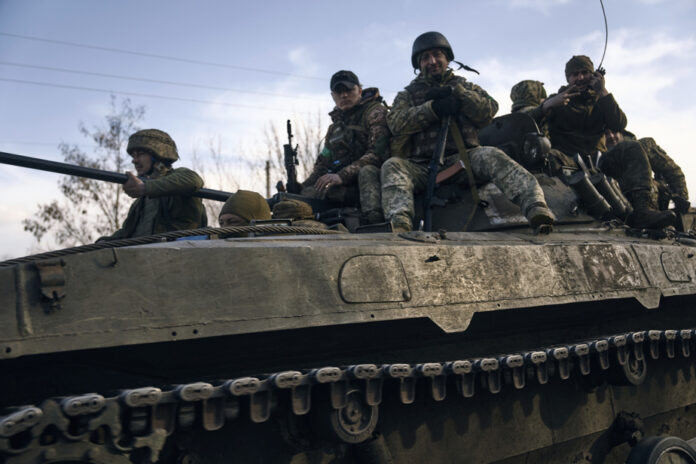(Kyiv) Ukraine announced on Thursday that it wanted to take advantage of the attrition of Russian forces in Bakhmout, the epicenter of the fighting in the east, to “very soon” go on the offensive, while Volodymyr Zelensky was on the move near from the southern front in the Kherson region, partially occupied by Russia.
The bloody battle for Bakhmout has been raging for several months and one thing is clear: at the cost of massive destruction and a high number of dead and wounded, the Russian army has still not conquered this city in Donbass , encountering resistance from the Ukrainians.
“The aggressor does not despair of taking Bakhmout at all costs, despite the losses in men and material,” Ukrainian ground forces commander Oleksandre Syrsky commented on Telegram.
The Russian troops mobilized en masse in Bakhmout and its surroundings, including the paramilitaries of the Wagner group, “are running out”, he assured.
“Very soon we will take advantage of this opportunity, as we did in the past near Kyiv, Kharkiv, Balaklya and Kupiansk,” he said, citing previous Ukrainian military victories.
General Syrsky, however, did not give details on the timetable for such a counter-offensive, expected for the spring by some experts, at a time however when Russia could also have concentrated resources to try to conquer the Donbass, its declared objective.
Russian soldiers, with Wagner’s units, now largely encircle Bakhmout from the north, east and south, making it difficult to supply the Ukrainian military.
But they resist, at the cost of heavy sacrifices, a strategy assumed by the command which counts on a war of attrition, before going on the offensive.
If the strategic importance of the city of Bakhmout itself is disputed, Moscow would like to announce a victory, after several humiliating setbacks last summer and autumn which had prompted Vladimir Putin to mobilize hundreds of thousands of reservists, civilians, then to appoint a new commander in charge of operations in Ukraine.
In this context, President Zelensky went on Wednesday near Bakhmout, in contact with the defenders of this city completely destroyed by months of clashes, before going to the Kharkiv region (northeast).
On Thursday, he appeared in the southern part of Kherson, partly occupied by the Russians.
According to images from the presidency, he made an appearance in particular in Posad-Pokrovské, a locality which suffered significant destruction and was in the hands of the Russian army until its withdrawal in the fall of 2022.
Mr. Zelensky also visited a power station damaged during the wave of strikes against Ukrainian energy facilities throughout the winter.
According to the presidency, this stay focused on reconstruction in the Kherson region and the head of state chaired a meeting on the subject there.
Russia occupied very soon after the start of its attack in February 2022 large parts of the Kherson region, including its eponymous capital.
A Ukrainian counter-offensive, however, forced Russian troops to withdraw from the northern part and retreat last November to the other side of the Dnieper, the great local river.
A stinging defeat, especially since Russian President Vladimir Putin had demanded the annexation of the entire region a few weeks earlier.
From now on, the liberated zone, a key agricultural region for Ukraine, and in particular the city of Kherson, is the daily target of Russian strikes.
On Wednesday, one person was killed and two others injured in Russian shellfire, according to the head of the regional military administration, Oleksandr Prokudin.
Mr. Zelensky’s series of trips comes just after a summit between Vladimir Putin and his Chinese counterpart Xi Jinping in Moscow, where they displayed their alliance against the West.
The Russian president cautiously supported the Chinese plan to settle the conflict in Ukraine, while accusing Kyiv of rejecting it.
According to press reports, Xi Jinping could now speak on the phone with Volodymyr Zelensky, which would be a first since the start of the Russian invasion which Beijing has neither publicly condemned nor openly supported.
Upon arriving at an EU summit, Dutch Prime Minister Mark Rutte said such an exchange should take place “as soon as possible”. “I think this morning,” he even added, without giving further details.
When questioned, the Ukrainian presidency had not responded to AFP’s requests at the start of the afternoon.


















